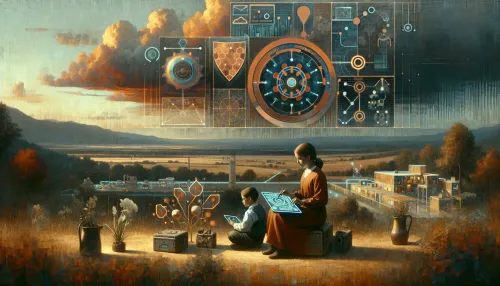Influential Innovations: How Gaming Communities Are Redefining Inclusive Spaces for Autistic Children

In recent years, the intersection of gaming and neurodiversity has sparked a transformative shift, creating inclusive spaces for autistic children to thrive. Through innovative approaches, gaming communities have actively contributed to fostering inclusivity, representation, and empathy, while redefining accessibility and engagement for neurodiverse players. Let's delve into the influential innovations that showcase the pivotal role of gaming in empowering autistic youths and shaping safe, supportive environments.
Building Communities Through Gaming: Fostering Inclusivity for Autistic Gamers
Gaming communities serve as dynamic hubs for autistic children, providing a platform where they can share common interests, connect with like-minded individuals, and nurture meaningful social interactions. The collaborative nature of multiplayer games encourages teamwork, communication, and mutual support, fostering a sense of belonging and camaraderie among autistic gamers. These inclusive spaces not only offer an avenue for self-expression but also facilitate the development of vital social skills, empowering autistic children within a supportive community that understands and embraces their unique perspectives.
Neurodiverse Representation in Games: Championing Diverse Characters and Storylines
The portrayal of diverse characters and narratives in video games plays a pivotal role in promoting representation and fostering a deeper sense of inclusivity for autistic players. Game developers have increasingly recognized the significance of crafting authentic, neurodiverse characters with multifaceted storylines that resonate with the experiences of autistic individuals. By championing diverse representation, gaming initiatives have extended a profound validation to autistic children, offering relatable role models and narratives that mirror their own realities. This concerted effort not only amplifies the visibility of neurodiversity within the gaming landscape but also cultivates an environment where every player feels seen and valued.
Related Article: Wearable Tech Advancements: Empowering Autistic Children with Innovative Therapeutic Interventions
Adaptive Gaming Technology: Redefining Accessibility and Engagement for Autistic Players
Advancements in adaptive gaming technology have revolutionized the playing experience for autistic children, ensuring that barriers to accessibility are dismantled. Tailored settings and customizable features enable players to personalize their gaming encounters, accommodating individual sensory sensitivities and cognitive preferences. From adjustable difficulty levels to specialized controller configurations, these innovations prioritize inclusivity by providing a tailored, comfortable gaming environment that empowers autistic players to engage with confidence. The seamless integration of adaptive gaming technology not only amplifies participation but also reinforces the fundamental principle of accessibility within gaming spaces.
Empowering Autistic Youths: The Evolving Role of Gaming in Skill Development and Social Interaction
Gaming serves as a fertile ground for nurturing valuable skills and fostering meaningful social interaction among autistic youths. The interactive nature of gaming cultivates cognitive abilities, problem-solving aptitude, and strategic thinking, offering a dynamic avenue for skill development within an engaging context. Moreover, multiplayer environments encourage collaborative engagement, cooperative decision-making, and effective communication – essential competencies that translate into real-world social interactions. By harnessing the power of gameplay, autistic children have the opportunity to hone their skills while forging connections within an environment conducive to their personal growth and development.
Cultivating Empathy: Bridging Understanding Through Immersive Gaming Experiences
Immersive gaming experiences have emerged as powerful catalysts for cultivating empathy and nurturing inclusive attitudes toward neurodiversity. Engaging narratives and interactive scenarios immerse players in diverse perspectives, fostering empathy by allowing them to see through the lens of neurodiverse characters. As autistic players interact with these immersive storylines, they not only find resonance but also witness their experiences reflected authentically within the gaming landscape. This profound immersion not only fosters empathy among all players but also ignites meaningful conversations about neurodiversity, enhancing awareness and understanding on a broader scale.
Shaping Safe Spaces: Nurturing Supportive Environments Within Gaming Communities
Within the realm of gaming communities, paramount emphasis is placed on nurturing safe spaces that prioritize understanding, respect, and support for all participants. Codes of conduct underscore the commitment to creating environments free from discrimination or prejudice while promoting empathy and inclusivity. By establishing designated safe spaces within gaming communities, autistic children are empowered to engage without fear of judgment or marginalization, fostering a pervasive culture of acceptance and advocacy. These safe spaces serve as beacons of support where individual voices are amplified, ensuring that every member feels validated within a nurturing community dedicated to their well-being.
Emerging as influential pioneers in cultivating inclusive spaces for autistic children, gaming communities continue to exemplify remarkable strides in redefining accessibility, representation, and empathy within the gaming landscape. Through unwavering dedication to fostering inclusivity and empowerment for neurodiverse players, these transformative innovations serve as a testament to the enriching impact of gaming on shaping supportive environments that resonate deeply with autistic youths.
In conclusion, the instrumental role played by gaming communities in championing inclusivity for autistic children illuminates a compelling narrative – one brimming with transformative potential that transcends virtual realms to permeate real-world connections, understanding, and advocacy.
Frequently Asked Questions
Neurodiverse representation in video games is crucial as it promotes inclusivity and validates the experiences of autistic players. By featuring authentic, multifaceted characters and relatable narratives, game developers create environments where autistic children can see themselves reflected. This representation fosters a sense of belonging and encourages empathy among all players, enhancing the gaming experience for everyone involved.
Gaming empowers autistic youths by providing a dynamic platform for developing valuable skills such as problem-solving, strategic thinking, and effective communication. Multiplayer environments encourage collaboration and cooperative decision-making, allowing autistic children to practice social interactions in a supportive setting. This interactive nature of gaming helps them hone their abilities while fostering meaningful connections with peers.
Safe spaces within gaming communities are essential for creating environments that prioritize understanding, respect, and support for autistic children. These spaces promote inclusivity by establishing codes of conduct that prevent discrimination and encourage empathy. By fostering a culture of acceptance, safe spaces empower autistic players to engage freely without fear of judgment, ensuring their voices are heard and valued.
Gaming communities foster inclusivity for autistic gamers by serving as dynamic hubs where they can connect with like-minded individuals and share interests. The collaborative nature of multiplayer games encourages teamwork and communication, helping to develop vital social skills. These inclusive environments provide opportunities for self-expression while nurturing a sense of belonging among autistic players.
Immersive gaming experiences are vital for cultivating empathy as they allow players to engage with diverse perspectives through interactive narratives. By experiencing the world through the lens of neurodiverse characters, players gain insight into their challenges and triumphs. This engagement not only fosters empathy but also sparks meaningful conversations about neurodiversity, enhancing awareness and understanding among all participants.
Check Out These Related Articles

Breaking Barriers: Transforming Autism Education with Virtual Reality

Data-Driven Parenting: Leveraging Technology for Informed Decision-Making in Autism Care

Adaptive Technologies in Autism Care: Innovations from Urban Centers
